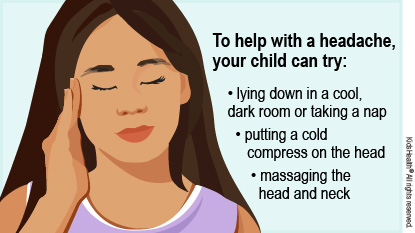Headache: How to Care for Your Child
A headache is pain felt somewhere in the head. Headaches in children and teens rarely have a serious cause. Follow these care instructions to help your child feel better and to know when to call your health care provider.


-
If your health care provider says it's OK, you can give acetaminophen (such as Tylenol®, Panadol®, or a store brand) or ibuprofen (Advil®, Motrin®, or a store brand). Give exactly as prescribed. Don't use these medicines for more than 2 days in a week without talking to your health care provider first.
-
Don't give your child aspirin, because it has been linked to a rare but serious illness called Reye syndrome.
-
Other things that may help your child's headache:
-
If your health care provider recommends keeping a headache diary, be sure to include:
-
when the headaches happen
-
how long the headaches last
-
what might have brought on the headache

Your child:
-
has a headache that doesn't get better after following the health care provider's instructions
-
has a headache that is getting worse
-
has headaches more than once or twice a month
-
throws up when having a headache
-
has headaches in the morning or that wake your child up
-
develops a fever with a headache
-
has a headache along with changes in mood or feeling anxious
-
can't go to school or do other activities because of the headache

Your child:
-
has a fever and stiff neck
-
has blurry or double vision
-
seems confused or isn't walking or talking normally
-
is hard to wake up

What causes headaches? Headaches in kids and teens usually are caused by:
-
infections (for example, from a virus)
-
too little sleep or sudden changes in sleep patterns
-
not drinking enough liquids
-
hunger
-
stress and tension in the muscles
-
allergies
-
medicines
-
changes in hormone levels
-
having a head injury
-
strong smells such as perfume, smoke, fumes, or a new car or carpet
-
caffeine
-
some foods (such as alcohol, cheese, nuts, pizza, chocolate, ice cream, fatty or fried food, lunchmeats and hot dogs, yogurt, aspartame, and MSG)
Can headaches be prevented? It can help prevent some headaches to:
-
Avoid any foods or smells that cause headaches.
-
Get plenty of sleep and stick to a regular sleep schedule.
-
Eat regularly scheduled meals and snacks.
-
Drink plenty of liquids, especially when exercising or in hot weather.
-
Find ways to lower stress, like meditation or yoga.
-
Get plenty of physical activity.
-
Avoid taking medicines that aren't needed.
-
Not drink caffeine.